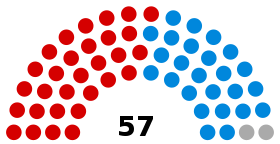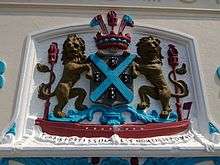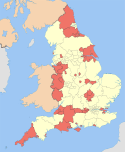Plymouth City Council
Plymouth City Council is the unitary authority for Plymouth, Devon. It has traditionally been controlled by Labour or the Conservatives, with Liberal Democrats rarely winning seats.
Plymouth City Council | |
|---|---|
 | |
| Type | |
| Type | |
| Leadership | |
Lord Mayor | |
Leader of the Council | |
Chief Executive | Tracey Lee |
| Structure | |
| Seats | 57 councillors |
 | |
Political groups |
|
| Elections | |
| First past the post | |
Last election | 2 May 2019 |
| Meeting place | |
| The Council House, Plymouth | |
| Website | |
| www | |
The council is run by the "leader and cabinet" model, where the leader of the council – normally leader of the majority party – is selected by fellow councillors, who also select the executive, commonly referred to as the cabinet. The leader of the council since May 2018 is Tudor Evans of the Labour Party, and the opposition group leader is Ian Bowyer of the Conservative Party.
History
Plymouth was recorded as a borough from 1276 and was incorporated in 1439. In April 1889, as a result of the reform of local government by the Local Government Act 1888, Plymouth became a self-administering county borough. In 1914, the Borough of Plymouth was united with the adjoining boroughs of Devonport and Stonehouse and in 1928, became a city by royal charter.[1] In 1971, a Local Government White Paper was published which would have left Plymouth, a town of 250,000 people, being administered from a council based at Exeter, a smaller city on the other side of Devon. This led to Plymouth lobbying for the creation of a new county of "Tamarside", to include Plymouth, Torpoint, Saltash, and their rural hinterland. This campaign was unsuccessful, and on 1 April 1974, Plymouth surrendered control of several areas to Devon County Council.
This continued until 1 April 1998, when, under the recommendations of the Banham Commission, Plymouth was designated to become a unitary authority, and Plymouth City Council was established.
Coat of arms

The coat of arms of the City of Plymouth show the four towers of the old Plymouth Castle, with the saltire of Saint Andrew, who is the patron of Plymouth's oldest church. The crest is a blue naval crown with a red anchor held in a lion's paw. The crown and anchor were part of the crest of the former County Borough of Devonport and represent the importance of the Royal Navy in the life of the city.[2] The Latin motto, Turris Fortissima est Nomen Jehova, means "The name of the Lord is the strongest tower".
Powers and functions
Plymouth City Council appoints four members to the Devon and Somerset Combined Fire Authority.[3] It is also responsible for arranging the elections for local Members of Parliament; in 2017 it was criticised after more than 6,000 votes were not included in the electoral result for one constituency,[4] and hundreds of applications for postal votes were not dealt with by polling day.[5]
Elections
Elections to Plymouth City Council happen once every year in May, for three years out of every four. Elected councillors serve terms of four years. This is because the council is split into thirds, with one third elected each year except the "fallow" year.
The council is traditionally dominated by the Labour and Conservative parties, with independents and the Liberal Democrats rarely winning seats. The UK Independence Party gained three seats at the local elections in 2014, who formed a coalition with the Conservatives. The three UK Independence Party councillors left UKIP and joined the Conservative Party in 2017.
At present, Labour has 30 councillors, the Conservatives have 25 and there are two independent councillors.
Lord Mayoralty
Plymouth has had a mayor in some form since 1439, and this tradition continued until 1934, when the king granted Plymouth the honour of having a Lord Mayor.
The role of the Lord Mayor is largely ceremonial, and has evolved into a figurehead position which is the public, non-political image of Plymouth City Council. The Lord Mayor chairs council meetings in the Council Chamber. The position usually rotates between the Conservatives and Labour, and is chosen on the third Friday of May. He then chooses the Deputy Lord Mayor.
The Lord Mayor's official residence is 3 Elliot Terrace, located on the Hoe. Once a home of Waldorf and Nancy Astor, it was given by Lady Astor to the City of Plymouth as an official residence for future Lord Mayors and is also used today for civic hospitality, as lodgings for visiting dignitaries and High Court judges, and it is also available to hire for private events. The Civic Centre municipal office building in Armada Way became a listed building in June 2007 because of its quality and period features. The Council has sold the building to a private developer, and staff have moved into new accommodation elsewhere in the city. It has retained the adjacent Council House, where it continues to hold its meetings.
Councillors
Elected members of the council hold office for four years and are elected "by thirds", meaning that most of the council's electoral areas have three councillors each and elections for one councillor per area are held in three years out of four. If an area has only two councillors, elections are held in two years out of four. Following elections on 2 May 2019, the councillors for Plymouth were as follows:
| Ward | Elected 2018 | Elected 2019 | Elected 2016 | |||
|---|---|---|---|---|---|---|
| Budshead | David Downie (Con) | Jonathan Drean (Con) | Jon Taylor (Lab)* | |||
| Compton | Andrea Johnson (Con) | Nick Kelly (Con) | Richard Ball (Con) Lord Mayor | |||
| Devonport | Bill Stevens (Lab) | Mark Coker (Lab)* | Kate Taylor (Lab)* | |||
| Drake | Margaret Corvid (Lab) | Chaz Singh (Lab) | None | |||
| Efford and Lipson | Neil Hendy (Lab) | Pauline Murphy (Lab) | Brian Vincent (Lab) | |||
| Eggbuckland | Ian Bowyer (Con)*** | Lynda Bowyer (Con) | Heath Cook (Con) | |||
| Ham | Gareth Derrick (Lab) | Tudor Evans (Lab)** | Tina Tuohy (Lab) | |||
| Honicknowle | Pamela Buchan (Lab) | Mark Lowry (Lab)* | Peter Smith (Lab)* | |||
| Moor View | Maddie Bridgeman (Con) | John Riley (Con) | Christoper Mavin (Lab) | |||
| Peverell | Jeremy Goslin (Lab) | Sarah Allen (Lab) | Tony Carson (Con) | |||
| Plympton Chaddlewood | Glenn Jordan (Con) | None | Sam Leaves (Con) | |||
| Plympton Erle | None | Terri Beer (Con) | Ian Darcy (Con) | |||
| Plympton St. Mary | David James (Con) | Patrick Nicholson (Con) | Andrea Loveridge (Con) | |||
| Plymstock Dunstone | Vivien Pengelly (Con) | Nigel Churchill (Con) | Kevin Wigens (Con) | |||
| Plymstock Radford | Rebecca Smith (Con) | Kathy Watkin (Con) | Michael Leaves (Con) | |||
| Southway | Jonny Morris (Lab) | Mark Deacon (Con) | Lorraine Parker (Lab) | |||
| St. Budeaux | Sally Haydon (Lab)* | George Wheeler (Lab) | Darren Winter (Lab) | |||
| St. Peter and the Waterfront | Susan McDonald (Lab) | Chris Penberthy (Lab)* | Ian Tuffin (Lab) | |||
| Stoke | Kevin Neil (Ind) | Jemima Laing (Lab)* | Sam Davey (Lab) | |||
| Sutton and Mount Gould | Mary Aspinall (Lab) | Sue Dann (Lab)* | Eddie Rennie (Lab) | |||
* Denotes Cabinet member ** Denotes Leader of the Council *** Denotes Leader of the Opposition
References
- "Plymouth". www.devon.gov.uk. Devon County Council. Retrieved 17 April 2016.
- "Coat of Arms". www.plymouth.gov.uk. Plymouth City Council. Retrieved 17 April 2016.
- "Devon and Somerset Fire and Rescue Authority".
- "Labour MP Luke Pollard's fury as votes left out of result". BBC News. 10 June 2017. Retrieved 13 June 2017.
- "Number of missing postal ballots in Plymouth rises". BBC News. Retrieved 13 June 2017.
